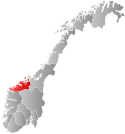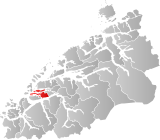User:Aqwis/Ålesund
Ålesund Municipality
Ålesund kommune | |
|---|---|
 | |
 Møre og Romsdal within Norway | |
 Ålesund within Møre og Romsdal | |
| Coordinates: 62°28′40″N 6°11′25″E / 62.47778°N 6.19028°E | |
| Country | Norway |
| County | Møre og Romsdal |
| District | Sunnmøre |
| Administrative centre | Ålesund |
| Government | |
| • Mayor (2007) | Bjørn Tømmerdal (H) |
| Area | |
• Total | 98 km2 (38 sq mi) |
| • Land | 93 km2 (36 sq mi) |
| • Rank | #388 in Norway |
| Population (2008) | |
• Total | 41,833 |
| • Rank | #18 in Norway |
| • Density | 430/km2 (1,100/sq mi) |
| • Change (10 years) | |
| Demonym(s) | Ålesundar Ålesunder[1] |
| Official language | |
| • Norwegian form | Neutral |
| Time zone | UTC+01:00 (CET) |
| • Summer (DST) | UTC+02:00 (CEST) |
| ISO 3166 code | NO-1504[3] |
| Website | Official website |
ⓘ is a city and municipality in the county of Møre og Romsdal, Norway. It is the largest city in the county, with a population of 41,833 as of 2008.[4] Although not the county capital, Ålesund is a major commercial centre and one of the most important fishing ports in Norway.
The Ålesund area has been settled since the Viking Age. The settlement of Borgund, today part of Ålesund, was the first settlement in the Sunnmøre district. Following the Black Death, Borgund disappeared, and was succeeded by the small community of Ålesund. In 1793, Ålesund, which at the time had a population of approximately 300 inhabitants, was granted staple port status. It finally became a market town in 1848. The great fire of 1904, which destroyed the vast majority of the city, was a pivotal event for Ålesund. The rebuilding, sponsored by Wilhelm II of Germany, involved the construction of several hundred brick buildings, many of which were built in the Art Nouveau style.
Ålesund has experienced strong population growth since the late 1980s. Ålesund University College is the second largest institution of higher education in the county, with approximately 2000 students.
History
[edit]Legend has it that Gangerolf (outside of Norway better known as Rollo), the 10th century founder of the dynasty of the dukes of Normandy, hailed from the community of Giske, north-west of Ålesund. At least three statues of Rolle exist: in the town park in Ålesund, in the city of Rouen, France, and in Fargo, North Dakota, United States.
| Population development, 1951–2008 | ||
|---|---|---|

| ||
| Source: Statistics Norway | ||
In the night of 23 January 1904, the town was the scene of the Ålesund Fire, one of the most terrible of the many conflagrations to which Norwegian towns, once built largely of wood, have been subjected. Practically the entire town was destroyed during the night, a gale aiding the flames[5], and the population had to leave the town in the middle of the night with only a few minutes' notice[citation needed]. Only one person died in the fire, the 76-year old Ane Heen, but more than 10,000 people were left without shelter[6].
Kaiser Wilhelm of Germany had often gone on vacation to Sunnmøre. After the fire, he sent 4 ships with materials to build temporary shelters and barracks. After a period of planning, the town was rebuilt in stone, brick and mortar in Jugendstil (Art Nouveau), the architectural style of the time. The structures were designed by approximately 20 master builders and 30 Norwegian architects, most of them educated in Trondheim and Charlottenburg, Berlin, drawing inspiration from all over Europe. The town has an unusually consistent architecture, most of the buildings having been built between 1904 and 1907. Jugendstilsenteret is a national interpretation centre, visitors can learn more about the town fire, the rebuilding of the town and the Art Nouveau style. Ålesund is a partner city of the Art nouveau network, a European network of co-operation created in 1999 for the study, safeguards and development of the Art nouveau.
Toponomy
[edit]Ålesund was originally known as Kaupangen Borgund,[7] kaupang being the Old Norse word for marketplace or town. The West Norse form of the current name was Álasund. The first element is (probably) the plural genitive case of áll which means "eel" and the last element is sund which means "strait" or "sound".[7] Before 1921, the name was written Aalesund.
Coat-of-arms
[edit]The coat-of-arms was granted on 1 April 1898. The arms symbolize the importance of fishing for the city. The type of ship was typical for the ships used in the 18th and 19th century and is taken from a drawing made in 1762. The waves and fish were added to the drawing in the arms.
The arms are shown in the Kaffe Hag album with the boat sailing right instead of sailing left.[8]
Geography
[edit]
It is part of the Sunnmøre district. It is a sea port, and is noted for its unique concentration of Jugendstil architecture.
Ålesund municipality occupies seven of the outer islands in the county of Møre og Romsdal: Hessa, Aspøy, Nørvøya, Oksnøy, Ellingsøy, Humla and Tørla. The city centre is located on the islands Aspøy and Nørvøy, while Hessa and Oksnøy contain residential areas. The second largest island, Elingsøy, used to be accessible only by boat or by road via Skodje municipality, but a subsea tunnel was built in 1987[9] to make travelling between the island and the city centre more convenient. The tunnel is 3,481 metres long,[10] and is currently being upgraded.[11] Situated 236 km north northeast of Bergen, Ålesund is adjacent to the Hjørund and Geiranger fjords, the latter being on UNESCO's list of World Heritage Sites.[12]
The municipality covers an area of 93 km2. The population is 41,385,[13] making the population density 430 people per km2. The population of the agglomeration, which includes parts of the neighbouring municipality Sula, is 45,299.[14] The municipality also contains three small, separate urban areas — Hoffland, Årset and Myklebost — with a total population of 1217.[14]
The city has a pronounced maritime climate with mild and windy winters; the coldest month of the year, January, has a mean temperature of 1.3 °C.[15] The lowest temperature ever recorded at Ålesund Airport, Vigra is a mere -11 °C.[citation needed]
Demographics
[edit]Ålesund was established as a municipality on 1 January 1838 (see formannskapsdistrikt). Borgund was merged with Ålesund on 1 January 1968. Sula was separated from Ålesund on 1 January 1977. Ålesund received city rights in 1848. It is the administrative center of the municipality as well as the principal shipping city of the Sunnmøre district. Ålesund municipality has a population of 41,385 as of 2007, while the Ålesund agglomeration has a population of 45,299.[14]
Cityscape
[edit]Economy
[edit]
Ålesund has one of the largest and most important fishing harbors in Norway. The town's fishing fleet is one of the most modern in Europe. Ålesund and surroundings also has a large furniture industry. Some well-known household items are manufactured here. In the 1950s and 1960s, Ålesund was one of the chief stations of the herring fishery business.
To the east of Ålesund lies the village of Sykkylven. The Ekornes factory, producing furniture such as the StressLess chair. Håhjem, another village near Ålesund, contains the headquarters of the Stokke company. Ålesund is also one of the harbours at which the Hurtigruten arrives two times per day.

Transportation
[edit]From Øye at the head of Hjørundfjord a road strikes south to the Nordfjord, and from Maråk on Geirangerfjord another strikes inland to Otta. The railway line Raumabanen starts at Åndalsnes, 120 km east of Ålesund, going to Dombås, then southwards on the Dovrebanen railway to Lillehammer and Oslo. Ålesund is a port of call for passenger and freight vessels travelling between Bergen, Kingston upon Hull, Newcastle, Hamburg, and Trondheim, including the Hurtigruta (Norwegian Coastal Express) cruise ships, which arrive in Ålesund twice a day.
The city's airport has several daily flights to/from Oslo, Bergen, Trondheim and Copenhagen.
Two weekly flights to/from Riga (Riga International Airport) (AirBaltic).
Culture
[edit]
The Norwegian Centre of Art Nouveau Architecture, Jugendstilsenteret, is situated in Ålesund. Its a museum and competence center with exhibitions telling the story of the city fire and Art Nouveu/Jugendstil in Norway and Europe.
The local football team, Aalesunds Fotballklubb (AaFK) was founded in 1914. The team played in the Norwegian premier league for the first time in the 2003 season. The team's new arena, Color Line Stadion, opened 16 April 2005 and is located approximately 1 km outside the town centre. Aafk's supporter club is called "Stormen" and has about 2,000 members.
The local newspaper is Sunnmørsposten, founded in 1882 and published six days a week. Ålesund is the site of the annual Norwegian Food Festival.
Education
[edit]Ålesund has a university college, Ålesund University College (Norwegian: Høgskolen i Ålesund, with approximately 1800 students and 150 employees. The Ålesund School of Art (Norwegian: Ålesund Kunstskole) is a school for visual arts located in Ålesund. The Norwegian School of Management has a campus in Ålesund, but it will close 1 August 2008.[16]
Ålesund videregående skole, also known as Latinskolen, formerly Aalesund Lærd- og Realskole, is the oldest secondary school in Ålesund, having been established in 1863.[17] Of the six upper secondary schools in Ålesund, including Latinskolen, Fagerlia videregående skole is the largest with room for approximately 1000 students.[18]
Famous residents
[edit]- Anton Ludvig Alvestad, mayor and government minister (1928)
- Helen Bjørnøy, politician
- Arnold Eidslott, song writer
- Hartvig Kiran, journalist, translator, author, song writer and composer
- John Arne Riise, football player
- Bjørn Helge Riise, football player
- Arild Rypdal, writer
- Olav Nils Sunde, entrepreneur
Sister cities
[edit]Ålesund is twinned with several towns:[19]
 Randers, Denmark, since 1947
Randers, Denmark, since 1947 Västerås, Sweden, since 1947
Västerås, Sweden, since 1947 Lahti, Finland, since 1947
Lahti, Finland, since 1947 Akureyri, Iceland, since 1949
Akureyri, Iceland, since 1949 Borgo a Mozzano, Italy, since 1979
Borgo a Mozzano, Italy, since 1979 Tacoma, USA, since 1986
Tacoma, USA, since 1986 Peterhead, United Kingdom, since 1967
Peterhead, United Kingdom, since 1967 Münster, Germany, since 2003
Münster, Germany, since 2003
In addition, the city has good relations with the town of Eu, France.[19]
References
[edit]- ^ "Navn på steder og personer: Innbyggjarnamn" (in Norwegian). Språkrådet.
- ^ "Forskrift om målvedtak i kommunar og fylkeskommunar" (in Norwegian). Lovdata.no.
- ^ Bolstad, Erik; Thorsnæs, Geir, eds. (2023-01-26). "Kommunenummer". Store norske leksikon (in Norwegian). Kunnskapsforlaget.
- ^ "16 Population, by sex, age and municipality. 1 January 2008. Møre og Romsdal" (in Norwegian). Statistics Norway. 2008. Retrieved 2008-10-27.
- ^ "Report from the fire chief" (in Norwegian). bybrann.no. 1904. Retrieved 2008-04-19.
- ^ "Facts about the fire" (in Norwegian). bybrann.no. 1904. Retrieved 2008-04-19.
- ^ a b "Betydningen Ålesund". Ålesund kommune. 2007. Retrieved 2007-10-16. (in Norwegian)
- ^ Norske Kommunevåpen (1990). "Nye kommunevåbener i Norden". Retrieved 25 October 2008.
- ^ Odd Sørås (2006). "Tunnelarbeidet må stanse" (in Norwegian). nrk.no. Retrieved 2007-10-17.
- ^ "Ellingsøytunnelen" (in Norwegian). Statens vegvesen. 2007. Retrieved 2007-10-17.
- ^ "Klart for anleggsstart i "Ålesundstunnelene"" (in Norwegian). Statens vegvesen. 2006. Retrieved 2007-10-17.
- ^ "West Norwegian Fjords – Geirangerfjord and Nærøyfjord". UNESCO. Retrieved 2007-10-16.
- ^ "Population, by sex, age and municipality. Møre og Romsdal. 1 January 2007". Statistics Norway. 2007. Retrieved 2007-10-15.
- ^ a b c "Urban settlements. Population and area, by municipality". Statistics Norway. 1 January 2007. Retrieved 2007-10-15.
- ^ "Normaler for Ålesund" (in Norwegian). Meterologisk institutt. 2007. Retrieved 2007-10-16.
- ^ "Om BI Ålesund" (in Norwegian). Retrieved 2007-10-16.
- ^ Ivar Gunnar Braaten. "Ja til Latinskolen" (in Norwegian). Retrieved 2007-10-16.
- ^ "02 Skolens navn: Fagerlia vgs" (in Norwegian). Utdanningsdirektoratet. 2007. Retrieved 2007-10-16.
- ^ a b "Vennskapsbyer" (in Norwegian). Ålesund kommune. 2007. Retrieved 2007-10-17.
External links
[edit]- Municipality website (in Norwegian)
- Jugendstil Centre/Art Nouveau Centre
- Ålesund Hospital (in Norwegian)




